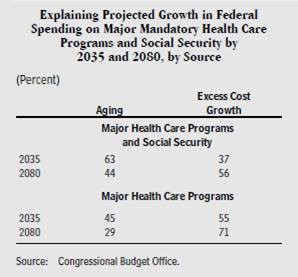Why Health Reform Was NOT Entitlement Reform
I wanted to pass on two additional nuggets from CBO’s report on the long-term budget outlook, released earlier this week. The first is a chart (reproduced below) on page 11 of the document, which quantifies the effect of aging on entitlement programs. The chart estimates that between now and 2035, 63% of the growth in entitlement spending, and 45% of the growth in health care entitlement spending, will be driven by demographic factors associated with the retirement of the Baby Boomers and general aging of the American population. The chart undermines the Administration’s rhetoric that “health care reform is entitlement reform,” because it reveals that even if health care costs were brought under control, entitlement programs face significant structural difficulties, as nearly half of the growth in entitlement spending over the next generation comes from demographics, NOT rising costs. And on that count, the health care law actually exacerbated those difficulties, slicing more than half a trillion dollars from the Medicare program to pay for new entitlements, such that CBO believes the law “would not enhance the ability of the government to pay for future Medicare benefits.”
In its report, CBO also released an alternative fiscal scenario that assumes many of the major savings provisions in the law – the productivity adjustments to providers, reductions in the growth of insurance subsidies, and caps on Medicare spending enforced by the Independent Payment Advisory Board – will not be implemented after 2020. In its introduction to the report (page 4 of the PDF), CBO noted that “the alternative fiscal scenario incorporates several changes to current law that are widely expected to occur or that would modify some provisions of law that might be difficult to sustain for a long period.”
To be sure, the alternative fiscal scenario was released in conjunction with an “extended baseline” budgetary scenario, which presumes that current-law policies remain in effect with few variations. And at Wednesday’s Fiscal Commission meeting, some Democrats questioned CBO’s assumptions behind the health care law, according to press reports. But Alice Rivlin, the first CBO Director (and a Democrat) “supported the move,” and Budget Committee Chairman Conrad noted that the alternative scenario generally provided “useful” information.
While Democrats may not like the move, the fact remains that the non-partisan CBO made an independent assessment that most of the major savings proposals in the health care law either are “widely expected” to be scaled back or would “be difficult to sustain for a long period.” That fact, and the analysis that much of America’s entitlement problem is structural in nature – a deficiency which the health care law did not even attempt to address – makes the CBO report difficult reading for individuals concerned about rapidly rising federal spending and deficits.
